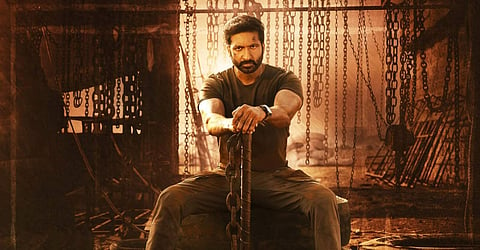Seetimaarr Movie Review: A fairly enjoyable potboiler
Rating:(2.5 / 5)
Even before the first frame of Seetimaarr appears on the screen, you get an idea of what the film might turn out to be—it begins with a thanks card to filmmaker Boyapati Srinu. This simple acknowledgment foreshadows unrestrained heroism, unabashed action sequences, problematic politics, and more importantly, scores of masala moments the film has in store for us. If anything, we have found a worthy successor to Boyapati Srinu in Sampath Nandi, and Seetimaarr is easily the filmmaker’s most coherent work.
Directed by: Sampath Nandi
Starring: Gopichand, Tamannaah, Digangana Suryavanshi, Tarun Arora
Seetimaarr opens in Ghaziabad, presented as a lawless land reigned by an evil crime lord Makhan Singh (Tarun Arora) who works as a police officer when he is not on a rape and murder spree. One of the earliest scenes that reflect the film’s wild and uncontainable energy has the villain emulate a video in which watermelons placed in a row are shot with a single bullet; Makhan's brother does the same, but with human heads (There is a similar scene in Deadpool, although it isn’t as graphic as this one). This make-or-break scene plays out even before the film’s title appears and if you buy it, you are in for a ride! I certainly did. When something as nonsensical and over-the-top as this transpires within five minutes, it is impossible to be surprised with whatever the film keeps hurling at us in regular intervals.
Seetimaarr has a simple storyline, but it manages to pack in a surprise or two, specifically with the route it takes in the second half. Karthi (Gopichand) is a bank manager who doubles up as a coach for the women’s Kabaddi team in the school built by his late father. Maintaining the school, however, is no longer financially feasible, and Karthi, who has always anticipated the arrival of this day, posits the idea of participating in a national Kabaddi tournament. He strongly believes it will bolster the village and school to reclaim the lost glory. One may wonder whether it’s practically possible for a state-level team to comprise members from a single school, but the writing takes an effort to recall real-life instances from the past to counter our doubt. A two-minute meeting between Karthi and a government executive is all it takes for the school’s team to get promoted to a state-level team. One other two-minute monologue sets straight the conservative parents who are skeptical about sending their children to the tournament. So far so good but this is barely the crux. The real action starts when Karthi gets pulled into a bloody brawl between his brother-in-law, Aravind (Rahman), an upright cop, and Makhan.
Although Seetimaarr didn't pose as a sports film, the screenplay even lets go of the faintest pretense towards the intermission to turn into a full-blown drama with a captivating central conflict that kept me engaged in the latter half. Replace Kabaddi with any other sport or, say, even an event that potentially exalts these girls to higher pedestal, there wouldn't be an ounce of difference. The narrative style in the second half, however, is rather fresh for a masala film like this one. Contrary to the propensity of mass films, which jump from one high point to another, Seetimaarr places a knife over the protagonist’s throat, commanding him to drive towards the resolution. Perhaps this is why Karthi, who is introduced as “Bahubali’s best friend” feels rather vulnerable in the second half, stripped off of the invincibility generally associated with protagonists in such films. Tarun Arora, who made a career out of playing the ‘corporate villain’ is surprisingly menacing as Makhan. It’s not about momentary highs, but the ultimate accomplishment. The pattern reminded me of another masala movie, Kavacham, which had its lead on the run in the second half. Seetimaarr, of course, is the more enjoyable film.
However, when you dig deep, Seetimaarr reeks of double standards. Tamannaah plays Jwala Reddy, a Kabaddi coach who has a feeble backstory that adds little to the larger context. Sampath feels Jwala is a strong female character, with his idea of a strong woman being someone who holds a guy by his crotch while mouthing dialogues about the power of Hyderabadi girls, even while lines like “Jwala…. mirchi masala,” play in the background. Of course, she also has to shake a leg in a song dressed in revealing outfits. There is a nice scene in the first half where the kabaddi players beat a few drunk molesters as Karthi secretly watches from far without interfering. But there is also another dance number in the second half that goes on the lines of, “naa pere pepsi aunty, naa pelliki nene anti (my name is pepsi aunty, I’m against my marriage — well, it rhymes in Telugu).” Moreover, there is a line about why girls have to be courageous; there is also a close-up of Digangana Suryavanshi’s thighs when she is introduced. You get the idea, right? The film’s efforts to sound progressive are negated by the inclusion of usual tropes of Telugu crowd-pleasers.
The film, backed by Soundararajan’s sunny visuals, has its moments, though. The action sequences are, as expected, over-the-top, but they are very much in alignment with the film’s universe (remember the watermelons?). By the time Gopichand wielded a hammer that is identical to Thor’s Mjollnir, in the climax, you are prepared for it and the over-the-top-ness doesn’t really shock you. Perhaps, the image of a Telugu actor holding Mjollnir in a dusty landscape that is straight out of a western will remain Seetimaarr's defining image. Again, did you ever think Seetimaarr would be a sports drama?

